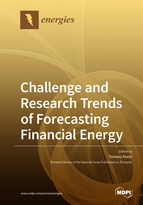Challenge and Research Trends of Forecasting Financial Energy
A special issue of Energies (ISSN 1996-1073). This special issue belongs to the section "C: Energy Economics and Policy".
Deadline for manuscript submissions: closed (31 January 2022) | Viewed by 19893
Submit your paper and select the Journal "Energies" and the Special Issue "Challenge and Research Trends of Forecasting Financial Energy" via: https://susy.mdpi.com/user/manuscripts/upload?journal=energies. Please contact the guest editor or the journal editor ([email protected]) for any queries.
Special Issue Editor
Interests: the phenomenon of the bankruptcy of enterprises; forecasting consumer bankruptcy; artificial intelligence in economic analysis; the use of fuzzy sets in finance; scoring models; early warning systems for the financial crisis of enterprises
Special Issue Information
Dear Colleagues,
The Guest Editor is inviting submissions to a Special Issue of Energies on the subject area captured in the title, ‘Challenge and Research Trends of Forecasting Financial Energy’. The measurement of economic entities' financial strength is one of the significant challenges of modern economic and financial research. With increased financial globalization, faster economic changes, and a new dimension of increased financial risk in the context of the COVID-19 pandemic crisis due to its biological nature and broad scope, affecting the whole world simultaneously, the issue of forecasting financial energy is gaining much more importance currently.
This Special Issue is devoted to the broad research area of forecasting financial energy of economic units such as enterprises, households, local governments, etc. Conceptualizing the term of financial energy, we aim to capture a wide spectrum of predicting and evaluating the financial standing, including various aspects of corporate finance, personal finance, and public finance.
We expect publications of a theoretical discussion, methodological deliberations, and application considerations that will be an important contribution to the development of literature on this topic.
Prof. Dr. Tomasz Korol
Guest Editor
Manuscript Submission Information
Manuscripts should be submitted online at www.mdpi.com by registering and logging in to this website. Once you are registered, click here to go to the submission form. Manuscripts can be submitted until the deadline. All submissions that pass pre-check are peer-reviewed. Accepted papers will be published continuously in the journal (as soon as accepted) and will be listed together on the special issue website. Research articles, review articles as well as short communications are invited. For planned papers, a title and short abstract (about 100 words) can be sent to the Editorial Office for announcement on this website.
Submitted manuscripts should not have been published previously, nor be under consideration for publication elsewhere (except conference proceedings papers). All manuscripts are thoroughly refereed through a single-blind peer-review process. A guide for authors and other relevant information for submission of manuscripts is available on the Instructions for Authors page. Energies is an international peer-reviewed open access semimonthly journal published by MDPI.
Please visit the Instructions for Authors page before submitting a manuscript. The Article Processing Charge (APC) for publication in this open access journal is 2600 CHF (Swiss Francs). Submitted papers should be well formatted and use good English. Authors may use MDPI's English editing service prior to publication or during author revisions.
Keywords
- financial forecasting
- financial risk
- corporate finance
- personal finance
- public finance
- households
- financial forecasting methods
- statistical models
- artificial intelligence
- financial crisis
- economic consequences of COVID-19






